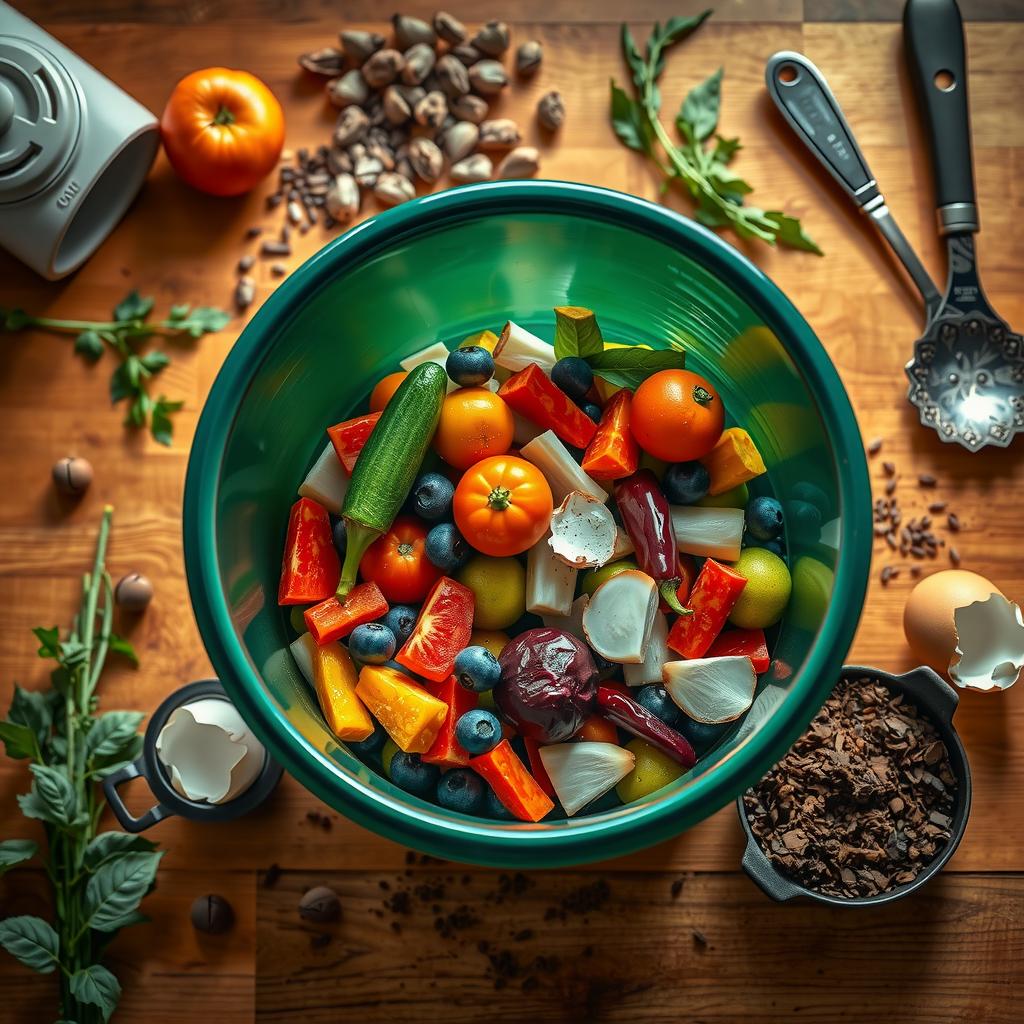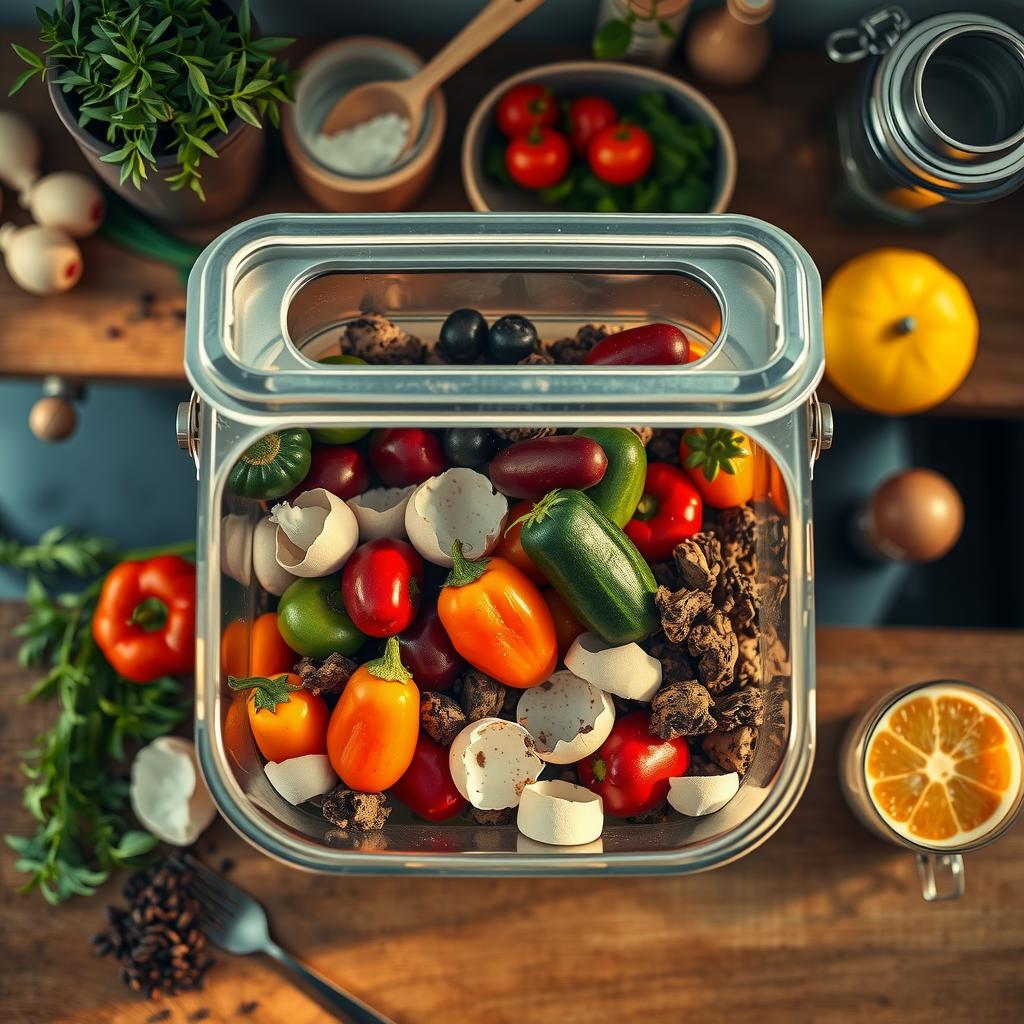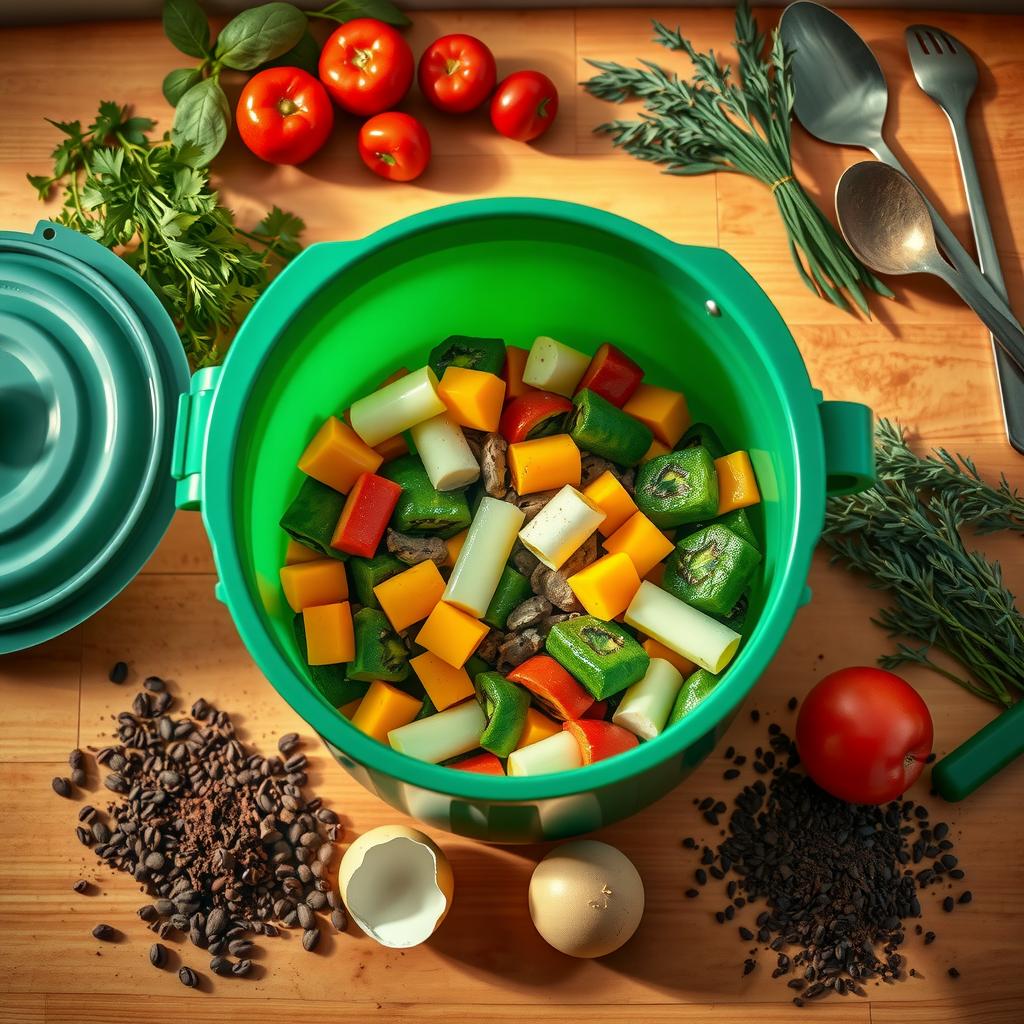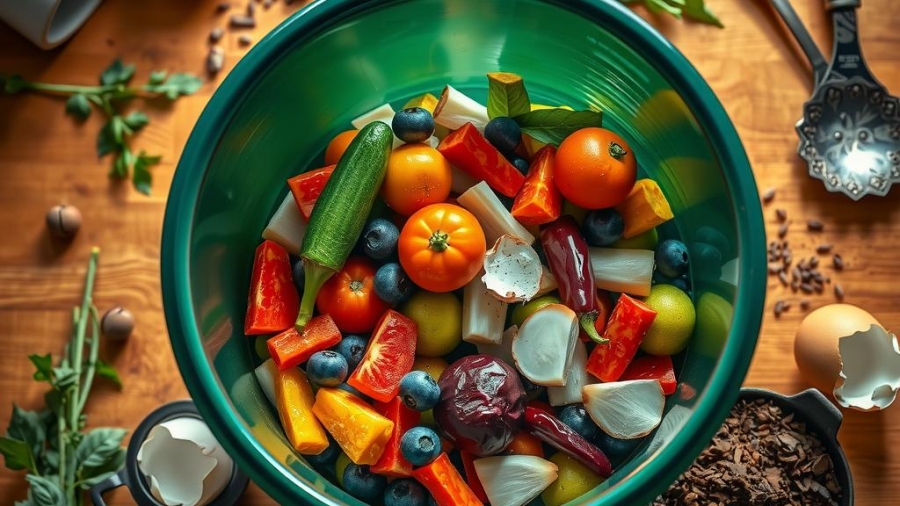In a world increasingly concerned about waste management and environmental sustainability, the question of how to effectively handle kitchen composting often arises. With millions of households generating significant amounts of organic waste daily, the challenge becomes not just disposing of this refuse but transforming it into valuable resources for gardens and ecosystems alike. The rise in popularity of compost bins reflects a growing awareness among consumers who seek eco-friendly solutions to manage their kitchen scraps while simultaneously reducing landfill contributions. However, with an overwhelming array of options available on the market—from compact countertop models designed for small kitchens to larger outdoor systems—the need for a comprehensive compost bin comparison becomes evident.
This article delves into various composting solutions, exploring different types of compost bins tailored for diverse living situations and needs. Each option presents unique advantages that cater to specific lifestyles—be it urban dwellers with limited space or suburban homeowners wanting to enhance their gardening practices through sustainable living choices. By examining key features such as size, ease-of-use, odor control capabilities, and material composition, readers can gain clarity on which solution best fits their requirements.
Additionally, understanding effective kitchen waste management does not only contribute positively towards personal gardening endeavors; it also aligns with broader goals related to climate change mitigation and responsible resource usage. Properly managed organic waste disposal reduces methane emissions from landfills while enriching soil health—a win-win scenario that supports both individual interests and communal well-being.
Through this exploration, readers will discover invaluable insights into making informed decisions regarding their composting journey without becoming overwhelmed by complex choices. Whether one is taking first steps toward creating nutrient-rich compost or looking to upgrade an existing system for better performance in terms of efficiency or aesthetics, the right information can empower anyone committed to eco-friendly practices.
Dive into this comparative analysis where every aspect is carefully considered: find out how each product stacks up against others in real-world scenarios that matter most for successful kitchen composting efforts!

Key Insights:
-
Selecting the Right Size: When choosing a kitchen composting bin, it’s essential to consider the size that fits your household’s needs. Smaller countertop models are perfect for compact kitchens or individuals with limited food waste, while larger outdoor units can handle significant volumes of organic matter. Understanding how much waste is generated on average will guide consumers in selecting an appropriate option that ensures effective kitchen waste management.
-
Odor Control Features: An important aspect of any composting solution is its ability to manage odors effectively. Many modern compost bins come equipped with advanced odor control mechanisms, such as charcoal filters or sealed designs that minimize unpleasant smells during decomposition. For those concerned about maintaining a pleasant kitchen environment, these features can significantly enhance the overall composting experience and encourage consistent use.
-
Technological Integration: The rise of smart technology has also influenced the development of innovative kitchen composting systems. Some bins now offer integrated apps or sensors that track decomposition progress and remind users when to turn their compost. This integration not only simplifies the process but also appeals to eco-conscious consumers who value efficiency in their sustainable living options, making it easier than ever to engage in responsible organic waste disposal practices at home.

Understanding the Environmental Impact of Kitchen Waste
The Ripple Effect of Kitchen Composting
In today’s world, where environmental sustainability is becoming a pressing concern, understanding the impact of kitchen waste and the benefits of kitchen composting is essential. Every year, millions of tons of food scraps end up in landfills, contributing to greenhouse gas emissions and loss of valuable nutrients that could enrich our soil. In fact, when organic materials decompose anaerobically—without oxygen—they produce methane, a potent greenhouse gas that has more than 25 times the warming potential of carbon dioxide over a century. By adopting eco-friendly composting practices at home, individuals can significantly reduce their carbon footprint while simultaneously transforming what would be garbage into nutrient-rich compost for gardens or potted plants.
Composting solutions are not only beneficial for reducing landfill waste but also play an integral role in promoting sustainable living options. When one chooses to implement kitchen composting techniques such as using a designated compost bin, they actively participate in a cycle that nourishes both plants and the environment. A well-managed compost pile undergoes aerobic decomposition which generates heat and speeds up organic breakdown without harmful emissions. This process offers substantial ecological advantages; it conserves water by improving soil structure through enhanced moisture retention and reduces reliance on chemical fertilizers that often contribute to runoff pollution.
Furthermore, embracing kitchen waste management through composting fosters an educational opportunity about resourcefulness and environmental stewardship within households—especially among children who learn from observing their parents’ responsible disposal practices. It cultivates awareness about food wastage; according to recent statistics, nearly one-third of all food produced globally is wasted! Through daily engagement with recycling leftover vegetable peels or fruit skins into a homemade composter instead of tossing them out carelessly—and even exploring different types like tumblers versus traditional bins—individuals can make informed choices tailored to their lifestyles.
Benefits Beyond Waste Reduction
Nutrient-Rich Soil Enhancements
The transformation from discarded scraps to rich humus is perhaps one of the most compelling aspects highlighting why individuals should consider investing time in organic waste disposal methods like kitchen composting. By utilizing specific ingredients such as nitrogen-rich greens (grass clippings) alongside carbon-heavy browns (dry leaves), users foster optimal conditions for microorganisms crucial for decomposition processes within their chosen composter setup. The outcome? A dark-brown substance bursting with nutrients ideal not just for enhancing backyard gardens but also indoor plant care!
Moreover, this practice aligns seamlessly with broader goals related to biodiversity conservation efforts since healthy soils encourage thriving ecosystems capable of supporting various life forms—from earthworms aerating ground layers beneath our feet downwards—to bees pollinating flowering plants above ground level! Studies have shown how improved soil health directly impacts local flora diversity—all stemming from simple initiatives taken at home regarding effective kitchen waste management.
Additionally—the act itself becomes therapeutic: engaging hands-on with natural elements encourages mindfulness while providing tangible satisfaction derived from witnessing personal contributions toward combating climate change firsthand! As participants explore compost bin comparison across different designs available on today’s market—which may include compact models suited best fit small spaces—the joys extend beyond mere functionality alone; discovering unique nuances embedded within each style opens doors towards greater appreciation surrounding nature’s cycles overall!
Addressing Common Misconceptions
Making Compost Accessible
Despite its numerous benefits however—many still harbor misconceptions surrounding what constitutes successful kitchen composting initiatives leading them astray before ever giving it chance! One prevalent myth suggests extensive knowledge required beforehand renders participation challenging—but this couldn’t be further from truth! Most households possess ample resources readily accessible without needing specialized training courses prior beginning journey towards eco-consciousness via effective organic material repurposing activities right inside kitchens themselves.
Educational institutions increasingly integrate teachings focused around sustainability principles which emphasizes importance learning how transform everyday actions lead positive changes community-wide thus allowing anyone willing engage reap rewards associated innovative approaches tackling pressing issues faced globally concerning energy consumption rates declining quality arable lands available meet demands growing populations need nourishment sustainably long-term future ahead humanity exists harmoniously planet shared together collectively respecting boundaries set forth nature itself ultimately preserving legacy generations yet come after us too!
Therefore—it becomes imperative dispel myths surrounding accessibly implementing these strategies so we might inspire greater involvement amongst varying demographics including youth adults alike fostering collective movement dedicated achieving healthier environments both locally globally through cultivating strong foundations establishing sound infrastructures support systems sustaining progress made thus far ensuring no single person left behind throughout journey undertaken toward greener tomorrow built upon principles love respect harmony established relationship between mankind mother earth herself uniting ultimately forging brighter path forward everyone involved side-by-side working together hand-in-hand creating lasting impacts felt everywhere lived experienced firsthand day-to-day basis wherever dwelled thrive onward continuously evolving adapting changing circumstances encountered along way forever striving betterment ideals pursued endlessly searching meaning purpose found intertwined lives led enriched fullest potentials realized openly freely shared widely among peers kindred spirits sharing common goal achieved success attained collaboratively bringing visions life fulfilled dreams blossomed brightly shining light guiding paths walked every step taken diligently onward furthers imp

Types of Compost Bins: Finding the Right Fit for Your Lifestyle
Exploring Suitable Composting Solutions for Every Setting
When it comes to kitchen waste management, choosing the right compost bin is essential for effective and sustainable organic waste disposal. Various options cater to different lifestyles, ranging from compact indoor solutions perfect for urban dwellers to larger outdoor models ideal for those with ample space. For individuals living in apartments or homes with limited outdoor area, small countertop composters can be a game-changer. These bins often feature odor control technologies that make eco-friendly composting feasible even in tight quarters. Such compact designs encourage kitchen composting by allowing users to easily collect food scraps without taking up much space.
For homeowners with gardens, traditional tumblers or stationary bins offer more substantial capacity and convenience. These outdoor models typically allow for better aeration and faster decomposition due to their design, making them suitable choices when considering a comprehensive compost bin comparison. Additionally, many of these larger systems incorporate features like adjustable air vents and easy-access doors that facilitate turning the compost mix effortlessly—a crucial aspect of maintaining an efficient breakdown process.
Moreover, some innovative options now combine elements of both indoor ease and outdoor efficiency through worm bins or bokashi systems—ideal solutions promoting high-quality humus production while minimizing odors significantly. Worms thrive on kitchen scraps, accelerating decomposition while enriching the soil; hence they stand as excellent examples of how modern technology enhances traditional methods in organic gardening practices.
Ultimately, choosing between these diverse types hinges upon personal preferences regarding space availability as well as specific requirements pertaining to lifestyle habits related to sustainability efforts. Assessing one’s commitment level towards adopting various sustainable living options will further guide this decision-making process effectively.
In summary, whether opting for a sleek indoor composter or a robust backyard model designed specifically for large volumes of material—all available products serve one vital purpose: transforming everyday waste into nutrient-rich resources beneficial not only for individual gardens but also fostering broader ecological benefits within communities alike. Understanding each choice’s unique advantages allows anyone interested in improving their approach toward responsible consumption patterns through thoughtful consideration surrounding proper organic waste disposal methods—the cornerstone upon which successful home gardening rests.
Maximizing Efficiency in Composting
Innovative Features and Technologies for Enhanced Composting
In the pursuit of eco-friendly composting solutions, the integration of innovative features and smart technologies has become paramount. A significant aspect involves effective odor control systems that mitigate unpleasant smells often associated with organic waste disposal, thereby making kitchen composting more appealing to users. Advanced compost bins now offer built-in ventilation systems designed to promote aerobic decomposition while minimizing odors, which is crucial for those managing kitchen waste at home. Furthermore, ease of use is another essential characteristic; modern designs prioritize user-friendliness with features such as convenient access lids and ergonomic shapes that facilitate easy mixing of materials. This approach not only streamlines the process but also encourages consistent engagement in sustainable living options by reducing barriers to regular participation.
Another exciting advancement in this field includes smart technology integration within composting solutions. These high-tech innovations allow users to monitor their compost bins from their smartphones or tablets, offering real-time data on temperature and moisture levels—key factors influencing successful decomposition. By employing these intelligent monitoring systems, individuals can easily adjust conditions within their bins to optimize performance without needing extensive knowledge about compost bin comparison or traditional methods. Additionally, some products incorporate automated stirring mechanisms that enhance aeration—a critical element for efficient breakdown of organic material—thus ensuring a quicker turnaround from kitchen scraps into nutrient-rich soil amendments.
The emphasis on sustainability extends beyond mere functionality; manufacturers are increasingly focusing on using recycled materials in product construction as part of a broader commitment to reducing environmental impact during production processes. This alignment with eco-conscious principles resonates well with consumers who are passionate about responsible consumption and waste management practices.
By considering these advanced features when selecting a kitchen waste management system, users can make informed decisions that align both with practical needs and environmental ideals. The market today offers an array of options tailored specifically towards enhancing efficiency through thoughtful design choices coupled with groundbreaking technology—all aimed at facilitating better habits around organic waste disposal while supporting greener lifestyles globally.
Ultimately, engaging effectively in composting requires understanding how various elements contribute towards maximizing efficiency—from odor control mechanisms to user-friendly designs and technological enhancements that simplify the process for everyone involved. Awareness of these aspects empowers individuals aiming for a minimalistic ecological footprint while promoting healthful soil regeneration through intentional organic recycling efforts.
Ultimate Guide to Choosing the Best Kitchen Composting Bin for Your Home
As more individuals embrace sustainable living options, effective kitchen waste management has become increasingly important. A significant volume of organic waste finds its way into landfills, exacerbating environmental degradation and contributing to greenhouse gas emissions. In this context, it is essential to explore various composting solutions that facilitate the transformation of kitchen scraps into valuable compost while minimizing ecological footprints.
When assessing different types of compost bins, it’s crucial to consider their suitability based on household size and lifestyle. For those with limited kitchen space, compact countertop models offer an ideal solution by providing a practical way to manage organic waste without occupying much room. These bins often feature odor control mechanisms and user-friendly designs that make them perfect for small kitchens or apartments where eco-friendly composting practices are desired but space is at a premium.
On the other hand, larger outdoor units cater to households generating substantial food waste volumes. These systems allow for efficient processing of organic matter over time and can significantly reduce landfill contributions when managed correctly. Many outdoor compost bins incorporate advanced features such as aeration systems or smart technology integration that tracks decomposition progress—enhancing overall efficiency in organic waste disposal.
Moreover, understanding each bin’s unique attributes empowers consumers in making informed choices aligned with their specific needs. Some models focus on speedier compost production through heated environments while others emphasize ease of use with simple assembly and maintenance processes. By comparing these innovative options available on the market today, readers can identify which solutions will best suit their personal preferences as well as promote responsible consumption practices within their homes.
Choosing the right kitchen composting system not only contributes toward individual sustainability efforts but also plays an integral role in fostering a greener planet overall. Simple changes made at home can lead directly to enriched soil and healthier ecosystems—a vital step towards nurturing mindful living habits.
FAQ:
Q: What factors should I consider when choosing a kitchen composting bin?
A: When selecting a kitchen composting bin, consider factors such as your available space (countertop vs outdoor), volume of organic waste generated, ease of use (odor control mechanisms), maintenance requirements, and any additional features like smart technology integration that may enhance your experience.
Q: How does using a composter benefit the environment?
A: Using a composter reduces landfill contributions by recycling organic materials back into useful soil amendments instead of allowing them to decompose anaerobically in landfills—which emits greenhouse gases—thus promoting more sustainable living practices.
Q: Can I use all types of food scraps in my kitchen composter?
A: While many food scraps are suitable for most types of composters (e.g., vegetable peels, fruit remains), some items like meat products or dairy can attract pests or cause odors; always check specific guidelines provided by your chosen composter model before adding materials.
